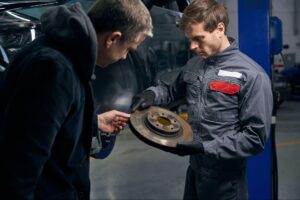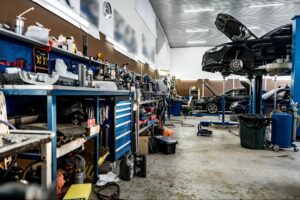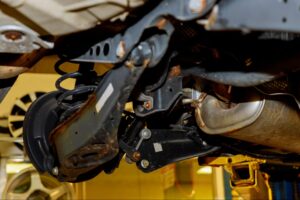
Why Regular Brake Repair and Maintenance Are Critical for Safety
A vehicle’s braking system is the most trusted line of defense on the road. Every driver depends on responsive brakes to stop safely in heavy traffic, harsh weather, or sudden emergencies. Ignoring brake repair creates risks that go beyond inconvenience—it endangers lives. Regular inspections and timely service keep brakes sharp, protect passengers, and prevent devastating accidents that could otherwise be avoided.
Why Regular Brake Repair Protects Every Mile Driven
Brake repair is more than a routine service; it is the foundation of safe and dependable driving. Each pedal press depends on a system that must be kept strong and responsive. Without consistent care, even minor wear can quickly turn into dangerous failures. Understanding why regular maintenance matters helps drivers make smarter, safer vehicle decisions.
Safe Braking Preserves Driver and Passenger Security
Reliable braking keeps drivers in control during sudden stops and emergencies. Without strong brakes, no amount of careful driving can prevent accidents. Regular maintenance ensures that stopping power remains sharp when it matters most. Responsive brakes reduce the risk of collisions and protect everyone in the car. That is why timely service is essential for safety on every trip.
Worn Brakes Reduce Stopping Power
As brake pads thin, they lose grip on the rotors, creating longer stopping distances. Heat from friction can warp the rotors, vibrating the car during braking. Calipers then work harder, which increases wear on connected parts. Over time, the driver notices reduced control and slower response in emergencies. This breakdown of stopping power creates unsafe driving conditions and must be corrected with professional repair.
Warning Signs That Signal Brake Problems
Most brakes give clear alerts before they fail; ignoring these signals is risky. Drivers may hear squealing or grinding noises when pads wear down to metal. A shaking brake pedal often points to warped rotors, while pulling to one side suggests caliper issues. A soft or sinking pedal can indicate air in the lines or low fluid. Additionally, a brake warning light should never be dismissed, as it highlights deeper problems in the system.
Unsafe Brakes Lower Driver Confidence
Trusting the braking system is essential for every journey, but worn brakes break that trust quickly. Drivers begin to hesitate in heavy traffic or during harsh weather because they fear delayed stopping. This constant stress increases fatigue and reduces overall focus on the road. The lack of confidence also impacts decision-making in emergencies, slowing reaction times. Brake repair restores reliability and allows drivers to stay calm and alert.
Delaying Service Creates Higher Costs Later
Avoiding brake maintenance may seem like saving money, but it nearly always leads to larger bills. Minor issues quickly spread through the system and damage costly components. Grinding or dragging parts stress the engine, tires, and suspension. Spending a little on time-sensitive service prevents a long chain of expensive repairs. For drivers, skipping service never pays off in the long run.
Repairs Become More Expensive Over Time
Worn pads eventually cut into the rotors, requiring complete replacement instead of a simple resurface. Calipers can seize from overheating, and those parts carry high replacement costs. Suspension and wheel bearings may also suffer from vibrations caused by brake neglect. As each connected part breaks down, the bill grows larger. Regular brake repair prevents these expensive problems before they begin.
Brake Problems Reduce Fuel Efficiency
When brakes drag, the engine must work harder to move the car forward. This hidden strain increases fuel use, making every trip more expensive. Reduced efficiency adds up over time and erases any savings from avoiding service. Uneven brake wear also creates extra tire resistance, shortening their lifespan. Neglecting brake repair drains money from multiple areas of the car’s performance.

Poor Brake Care Hurts Vehicle Resale Value
Potential buyers hesitate when a car has noisy brakes, warning lights, or visible wear. Brake neglect signals a lack of regular care, lowering confidence in the overall condition. On the other hand, professional repair records show responsible ownership and help maintain resale value. Cars with reliable brakes sell faster and for higher prices. Maintaining the brake system protects both safety and long-term investment.
Consistent Maintenance Extends Vehicle Lifespan
Cars last longer when their systems work together without stress. Neglected brakes create extra strain on suspension, steering, and tires. Over time, that damage shortens the lifespan of the vehicle. With consistent service, the car runs smoother and avoids costly failures. For drivers who want reliability, brake maintenance is a direct path to durability.
Inspections Stop Problems Before Emergencies
Brake inspections identify hidden issues such as leaks, uneven wear, or low fluid. Technicians measure pad thickness, test performance, and make adjustments as needed. Finding these problems early prevents sudden failures on the road and reduces the chance of being stranded with an unsafe vehicle. Inspections also keep drivers ahead of issues instead of reacting after breakdowns.
Replacing Pads and Fluid Improves Performance
Brake pads wear down naturally, and replacing them restores smooth, reliable stopping. Old brake fluid collects moisture, lowering its ability to transfer force effectively. When replaced, the fluid gives the driver a firmer, more consistent pedal feel. New pads also protect rotors from deep grooves or cracking. These updates make every drive safer and extend the system’s durability.
Strong Brakes Protect Connected Systems
Healthy brakes spread the load evenly across tires, improving tread life. When braking is balanced and smooth, suspension parts face less stress. Steering components benefit from reduced vibrations, keeping handling precise. Over time, this protection lowers the number of unrelated repairs needed. A strong braking system supports the health of the entire car.
Brake Repair Is a Smart Safety Investment
Strong brakes protect the driver, passengers, and others on the road. Brake repair reduces accident risks and keeps travel stress-free. Families and commuters depend on responsive systems every day. Treating brake care as an investment highlights both its financial and safety value.
Brakes Prevent Accidents and Collisions
Healthy brakes shorten stopping distances and reduce the chance of rear-end crashes. Responsive systems help drivers avoid hazards in emergencies. Reliable repair prevents brake fade during heavy use, such as steep hills. These benefits reduce accident risks across a wide range of driving conditions. Every collision avoided demonstrates the value of consistent brake maintenance.

Confidence and Comfort Come From Reliable Brakes
Drivers feel calmer when they know their brakes will respond immediately. Confidence grows during long trips, busy commutes, and harsh weather. Families benefit from smoother rides free of grinding or vibrations. Additionally, reduced anxiety improves focus and reaction times behind the wheel. The comfort of dependable brakes enhances every journey.
Safe Brakes Support Community Well-Being
Neglected brakes affect more than the driver—they endanger pedestrians, cyclists, and nearby cars. Well-maintained vehicles reduce traffic accidents and ease pressure on emergency services. Communities with safer cars experience fewer disruptions from collisions. Brake repair contributes to a culture of responsibility on the road. Every service appointment helps build safer neighborhoods and cities.
Why Professional Brake Repair is Safer Than DIY
Professional brake repair delivers accuracy that do-it-yourself fixes often lack. Certified mechanics use specialized tools, quality parts, and years of training. Mistakes in this system can be dangerous, so expert service offers protection. Additionally, professional shops provide warranties that drivers cannot secure independently.
Certified Mechanics Provide Skilled Care
Professional technicians can diagnose complex brake issues and spot problems drivers never notice, such as subtle leaks or early rotor damage. Repair shops also have access to factory-approved parts that meet strict safety standards. Additionally, many services come with warranties that guarantee reliability. This expertise makes professional brake repair far more dependable than self-repair attempts.
DIY Fixes Come With Serious Risks
Drivers who attempt brake repairs without training often make minor errors with serious consequences. Incorrectly installed pads or improperly bled lines can lead to sudden failure. Cheap parts from unreliable sellers usually wear down quickly and compromise safety. Without professional equipment, achieving safe, balanced braking is not easy. These risks make DIY brake repair unsafe and unreliable for long-term use.
Expert Service Improves Long-Term Reliability
Experienced mechanics do more than solve immediate problems; they prevent future ones. They examine the entire system to catch hidden issues, including hoses, rotors, and calipers. Their recommendations are tailored to the vehicle’s mileage, usage, and driving conditions. This personalized approach extends the lifespan of the system. Drivers who choose professional repair benefit from lasting safety and consistent performance.
How Often to Schedule Brake Repair and Maintenance
The best schedule for brake service depends on driving style and road conditions. City traffic, frequent stops, and heavy loads all increase wear. Cars used for long highway trips may require fewer services but still need inspections. A consistent schedule ensures safety and cost savings over the vehicle’s lifetime.
Driving Habits Affect Brake Wear
Stop-and-go city driving wears down pads faster than steady highway miles. Towing or carrying heavy loads puts extra stress on the system. Harsh climates, from freezing winters to extreme summer heat, shorten brake life—road salt, rain, and humidity cause rust and corrosion in components. Every driver’s habits shape how often brake repair becomes necessary.
Recommended Brake Service Intervals
Most professionals suggest checking brake pads every 10,000 to 15,000 miles. Rotors often last longer but usually need service between 50,000 and 70,000 miles. Brake fluid should be replaced every two to three years to maintain strength. Complete system inspections twice yearly provide extra safety. Following these intervals builds a precise and reliable maintenance routine.
Seasonal Checks Prevent Failures
Seasonal inspections prepare vehicles for extreme conditions before problems appear. Winter road salt causes corrosion, while summer heat reduces fluid effectiveness. Checking pads, fluid, and rotors before each season improves reliability. These steps reduce the chance of dangerous surprises in demanding weather. Seasonal service connects brake care to broader vehicle maintenance.
Prioritize Brake Repair for Safer Roads Ahead
Every driver depends on brakes that respond instantly, no matter the conditions. Putting off service damages the vehicle and risks lives with every mile. Professional brake repair restores confidence and keeps families protected on the road. Prioritizing this care today builds the foundation for safer roads tomorrow for you and everyone who shares them.
Stay ahead of car care with the Cordova Auto Service & Mufflers blog, where practical tips meet professional expertise for every driver.




